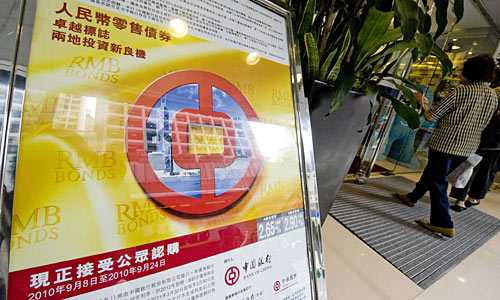|
 |
|
BIG BOND SALE: Bank of China Ltd. begins selling up to 5 billion yuan ($735 million) of two- and three-year yuan-denominated bonds in Hong Kong on September 8. It was the third time the bank issued these bonds in Hong Kong since mainland banks were allowed to do so in June 2007 (LU XIAOWEI) |
Numbers of the Week
60.1%
The Purchasing Managers' Index for China's non-manufacturing sector in August remained the same as July's percentage, at 60.1 percent, said the China Federation of Logistics and Purchasing.
162 million
China's railway passenger traffic in August rose 8.1 percent year on year to hit 162 million people, said the Ministry of Railways.
TO THE POINT: China's outbound direct investment grows as firms hunt down opportunities to expand overseas. International hot money seems to be pulling out of the country after months of torrential inflows. U.S. auto behemoths bask in the glow of an auto market boom in China. The Yangzijiang Shipbuilding Holdings debuted on the Taiwan Stock Exchange on September 8, underlining growing financial tie-ups between Taiwan and the Chinese mainland. China snaps up Japanese government bonds in a bid to diversify its foreign reserve holdings. The Chinese Government pushes for stronger M&A activities.
By HU YUE
Outbound Rush
Despite a deep downturn in the world economy, Chinese firms are beefing up efforts to head overseas.
China's outbound direct investment (ODI) rose 1.1 percent year on year to $56.53 billion in 2009, the largest among developing countries, said a report jointly released by the Ministry of Commerce (MOFCOM), the National Bureau of Statistics and the Sate Administration of Foreign Exchange on September 5. This was the eighth consecutive year of growth.
By the end of 2009, Chinese enterprises established at least 13,000 overseas companies in 177 countries, with their combined assets topping $1 trillion, said the report.
The manufacturing industry was the most coveted area of Chinese ODI, followed by the wholesale and retail sector and tenancy and business services, said Shen Danyang, a senior official of MOFCOM.
Successful expansion overseas would allow Chinese companies to take production closer to the markets it serves, and generate greater returns from the economy of scale.
The government will continue to strengthen efforts to push forward outbound investment and foster multinationals with global footprints, said Chinese Vice President Xi Jinping, at the opening ceremony of the second World Investment Forum on September 7 in Xiamen, Fujian Province.
Capital Outflow
Signs are surfacing that international hot money is bowing out of China.
In July, the country reported 171 billion yuan ($25.2 billion) of increased money supply in circulation from foreign exchange inflows, including the trade surplus, foreign direct investment (FDI) and international hot money, according to the central bank.
Since the trade surplus and FDI stood at $28.7 billion and $6.92 billion, respectively, the hot money outflow was estimated at $10.4 billion in July, said a recent report by the Research Center for International Finance under the Chinese Academy of Social Sciences (CASS). This is the third consecutive month of net outflow after torrent inflows in the first four months of this year.
Risk aversion came to the fore as fears about the Greece debt crisis abounded, promoting speculative investors to turn to the safe U.S. bond market, said Zhang Ming, General Secretary of the CASS' Research Center for International Finance.
Meanwhile, investors have lost some interest in China as expectations for a rise in the value of the yuan weakened and policymakers poured cold water on the hot property market, he said.
| 